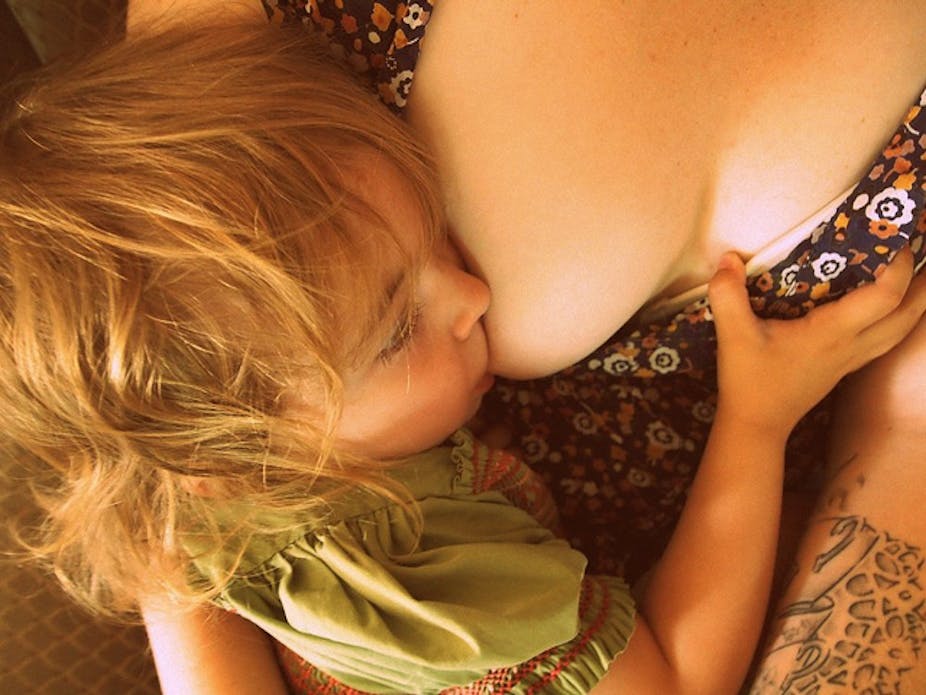Infants should be exclusively breastfed until six months of age and solids should be introduced at “around six months”, according to official new infant feeding guidelines released today.
The guidelines, released by the National Health and Medical Research Council, are based on the latest scientific findings and are an update on 2003 guidelines.
The decision to keep the recommended age at which solids are introduced to around six months is significant because the food industry had lobbied to have the recommended age reduced to four months, one expert has said.
A press release accompanying the release of the guidelines said there were several differences between the old and new guidelines.
The press release said that, “Specifically, the evidence has strengthened for:
- The benefits of breastfeeding.
- The association between breastfeeding and a reduced risk of becoming obese in childhood, adolescence and early adulthood.
- The association between breastfeeding support and increased duration of exclusive and any breastfeeding.
- The importance of introducing solid foods at around 6 months of age to meet nutritional requirements and decrease risk of allergy development.
- The order of introducing solids; as long as iron-rich foods are included in first foods, foods can be introduced in any order and at a rate that suits the infant.
- The implementation of the Baby Friendly Hospital Initiative improves breastfeeding outcomes.”
Professor Amanda Lee, Chair of the Dietary Guidelines Working Committee, said the scientific evidence clearly showed that “around six months of age is the optimum time to introduce solids for children.”
“There have been some reports in the media about allergies and the suggestion that infants should be introduced to solids at an earlier age to stop allergies. We found no evidence of that,” she said.
However, the new guidelines said that delaying the introduction of solids beyond six months may increase the risk of allergies.
“We don’t want mothers to be introducing solids after seven months,” Professor Lee said.
Dr Karleen Gribble, Adjunct Research Fellow at the School of Nursing at the University of Western Sydney said it was “a really big deal” that the new guidelines retained six months as the recommended age that babies start solid foods.
“There was extensive lobbying to get that changed [to four months] from industry,” said Dr Gribble, who was not involved in writing the new guidelines.
“We’ve yet to have the labelling changed on baby foods in Australia, so if you go into the shops you’ll see baby foods labelled as suitable from four months.”
Introducing solids too early put the baby at risk of infection, said Dr Gribble.
“And also their guts aren’t really mature enough to digest the food properly anyway. When the recommendation was four months, a lot of parents were introducing them at two to three months because ‘their babies were very advanced’,” she said.
Dr Yvette Miller, Senior Lecturer in Public Health at the Queensland University of Technology, said she was pleased to see the guidelines made it clear that infants do not need other fluids in the first six months of life.
“This is something about which there is still a lot of conflicting advice and confusion among women. Some of our recent work has found that infants who are given other fluids early (like being given water in the first month of life) have double the risk of too-early introduction of solids,” said Dr Miller, who was not involved in writing the guidelines.
Dr Miller said it was good to see the guidelines advising that continuing breastfeeding beyond the six-to-12-month period is beneficial for mother and baby and recommending unrestricted breastfeeding (instead of scheduled feeds) as a practice that may overcome many common breastfeeding problems.
Breastfeeding
Where possible, babies should be breastfed exclusively for the first six months of life and breastfeeding should continue for “as long as the child and mother desire”, the document said.
To help facilitate that, health workers should encourage community-based services supporting breastfeeding families and “support in the community and workplace for flexible work schedules, suitable environments for breastfeeding, expressing breast milk, storage of expressed breast milk and child care,” the document said.
Paid parental leave schemes and lactation break entitlements should also be promoted, the guidelines said.
Research showed that breastfeeding reduced the risk or severity of obesity, SIDS, asthma, urinary tract infections and a range of other problems, the guidelines said.
While most women do not have medical problems that prevent them from breastfeeding, the guidelines recognised it will not be possible for everyone and provided advice on how health workers and parents can ensure formula is used correctly.
Crying
It is normal for six-week-old infants to cry for around three hours a day, the guidelines said.
“Despite the fact that disease is diagnosed in less than 5% of such infants, they are at risk of medicalisation of their behaviour, and of diagnosis of a range of disorders, including colic (unsettled infant), ‘silent reflux’ and lactose intolerance. They are also at risk of early cessation of breastfeeding,” the document said.

